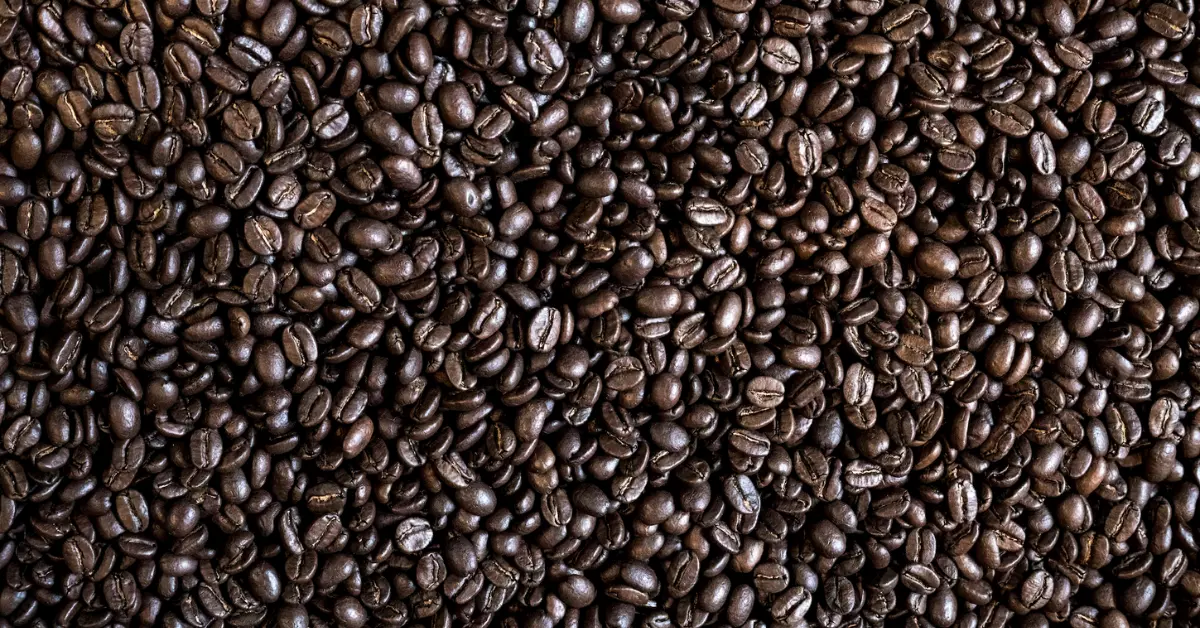
We tend to use different types of coffee beans for our favorite coffee. Different beans have different features along with some common features. Most of the coffee beans are oily more or less. But why so? Why are coffee beans oily? This is a common concern for many of us. Let’s dive in to know why coffee beans are oily, whether it’s good for your health or not.
Most of the coffee beans hold natural oils which is the main reason for coffee beans being oily. Some other factors can cause the oiliness like the type of your coffee beans and the roasting level. But oily beans are the most aromatic and flavorful. If you store it well, it can provide you with amazing quality coffee.
Components of Coffee Beans
To find out why coffee beans are oily, let’s check out all the components of coffee beans. All the components are not equally present. So, we are mentioning the percentages of the common components of coffee beans. Here, these percentages are for 1 gram of coffee beans.
| Components of Coffee Beans | Approximate Percentages |
| Moisture | 8 to 12 % |
| Lipids or Oils | 12 to 16 % |
| Carbohydrates or Sugars | 30 to 40 % |
| Proteins | 8 to 12 % |
| Caffeine | 1 to 2 % |
| Chlorogenic Acids | 5 to 7 % |
| Cellulose and Fiber | 4 to 7 % |
| Ash or Inorganic Compounds | 3 to 4 % |
So, as you can see per gram of coffee bean there is 12 to 16 percent of oils. This natural oil makes most of the coffee beans oily.
Types of Coffee Beans With Their Specific Oils
Put a glimpse at the type-specific oils of different coffee beans. Here’s a short overview of the oils present in different types of coffee beans.
| Types of Coffee Beans | Oil Composition | Approximate Percentages of Oil |
| Arabica | A balanced profile of oils,
Includes essential oils |
10 to 15 % |
| Robusta | A higher lipid content | 12 to 16 % |
| Colombian | A diverse range of essential oils | 9 to 13 % |
| Sumatra Mandheling | Earthy, herbal notes from the oils | 11 to 15 % |
| Ethiopian Yirgacheffe | Unique essential oils | 10 to 14 % |
| Kenyan AA | Includes essential oils | 10 to 14 % |
| Java | Earthy oil notes | 12 to 16 % |
| Blue Mountain | Well-balanced oil | 9 to 13 % |
| Kona | Mild, fruity oils | 10 to 14 % |
| Guatemalan | Nutty oils | 10 to 14 % |
| Tanzanian Peaberry | Wine-like essential oils | 10 to 14 % |
| Sulawesi Toraja | Fruity and spicy oils | 11 to 15 % |
| Costa Rican Tarrazu | Floral essential oils | 9 to 13 % |
| Indian Monsooned Malabar | Woody and spicy oils | 12 to 16 % |
| Vietnamese Robusta | Strong and bold oils | 12 to 16 % |
| Hawaiian Maui | Nutty essential oils | 10 to 14 % |
| Yemen Mocha | Fruity oils | 11 to 15 % |
Reasons for Coffee Beans Being Oily
Why are coffee beans oily? Is it only for natural oils? Actually, there are other factors that make the coffee beans oily. Let’s go through the reasons along with the main reason (natural oil).
Natural Oil or Lipid Content: This is the main source of oil in coffee beans. It can vary according to different types of beans as we mentioned earlier. Normally the lipid or oil content is 12 to 16 percent in 1 gram of coffee bean.
Roasting Process: The way you roast your beans can increase or decrease the oil. The roasting process mainly heats your coffee beans. This heat breaks down the lipid or fatty acids of the beans. So, these components come out of the surface of the beans which we see as oils.
Dark Roasting: The more you roast your coffee beans, the more it will be oilier. Dark roasting breaks more contents inside the beans and brings them to the surface. So, if you roast for a long time or roast darker, oil will increase.
Variety of Beans: Different coffee beans have different amounts of components. As we have provided in the table earlier, the percentage of oil slightly varies in Arabica, Robusta, Java, Kenyan AA etc.
Storage Conditions: If you do not store your beans well, they will get rotten and the oil content will not be the same. Many factors like temperature, humidity or exposure to air affect the oil content of the beans.
Growing Climate: Climate affects the oil or lipid level in coffee beans. Suppose, you are growing your coffee beans at a higher altitude (height) and the climate is cooler. Then your beans will tend to be oily (with higher lipid content). But in lower altitudes and hot climates, you can expect less oily beans.
So, these are the possible reasons why coffee beans are oily.
Are Oily Coffee Beans Good or Bad for Your Health? (Positive and Negative Aspects)
You might wonder if it is good or bad for your health to use oily coffee beans. Actually, oily beans can have both positive and negative effects on your health. Check out the following points to decide whether it is good or not.
Potential Health Benefits (Positive Aspects)
Antioxidants: Antioxidants are some compounds which protect our body cells from damage. Some antioxidant properties are found in coffee bean oils. Ultimately the oil works like a shield to protect our cells. It also lessens the risk of health issues like cancer or liver-related issues.
Cognitive Benefits: As you know coffee beans contain caffeine and antioxidants as well. This combination can provide you with cognitive benefits. You can have good memory, and mental alertness and the risk of certain mental illnesses can decrease.
Alertness with Improved Mood: Along with coffee oils, caffeine can help you to be alert. Moreover, it can boost your mood and make you feel energetic.
Reduced Risk of Certain Diseases: Oily coffee beans can help you be out of risk of certain diseases. It includes stroke, Type 2 diabetes, Cancer etc. But you are out of risk till you consume in moderation.
Health Risks (Negative Aspects)
Acrylamide Formation: Do you know what acrylamide is? It is one kind of chemical substance that can form naturally in many food items. It is harmful to our health and even it can make us vulnerable to diseases. If you roast your oily beans in high flame, acrylamide can be formed and create health risks.
Stomach Discomfort: If you have a sensitive stomach, watch out before consuming. The oils in your coffee beans can sometimes cause discomfort like irritation in the stomach, digestive problems or heartburn.
Increased Cholesterol Levels: Some of the oils in coffee beans tend to increase LDL (low-density lipoprotein) cholesterol levels. It is referred to as bad cholesterol as it leads to heart diseases.
Caffeine Sensitivity: Those who are caffeine-sensitive should avoid or minimize their coffee consumption. Caffeine can lead to sleepless nights, anxiety and other health issues.
So, oily coffee beans have both health benefits and risks. That’s why it will be wise if you consider your health issues first. If you are not sensitive to anything we’ve mentioned and are not dealing with any diseases, grab the benefits of coffee beans. It can be good for your health only if you consume it in moderation.
Our Suggestion for Storing Oily Coffee Beans
As you know, “Why are coffee beans oily?”, it’s time to learn how to deal with these oily beans. A proper storing process is needed to keep your beans fresh. So how to store the beans? Take a look at our suggestions for storing oily coffee beans properly. It will help you hold the freshness and prevent the beans from getting rotten.
Use an Airtight Container: Keep the oily beans in an airtight container which has a one-way valve or opening. This way it can let go of the gasses formed inside the container without letting air in. Here are some of our recommended containers for your coffee.
| Recommended Airtight Containers for Oily Coffee Beans (With One-way Valve) | |
| 01 | Friis Coffee Vault |
| 02 | Airscape Coffee and Food Storage Canister |
| 03 | Planetary Design Airscape Coffee Storage Container |
| 04 | Coffee Gator Stainless Steel Coffee Canister |
| 05 | Coffeevac Vacuum Sealed Coffee Container |
Keep Your Coffee Beans Cool: Cool place is good for oily beans but avoid the refrigerator or freezer. You can simply keep it in a cool dark place where there is no direct sunlight. For your better understanding, we are giving you the temperature range. The range is 15 to 24° Celsius or go for 60 to 70° Fahrenheit.
Protect from Light: Keep the beans away from direct sunlight or light sources. The reason behind this is that oily beans are sensitive to light and they may get rotten easily under sunlight. So keep it in a dark place in any of our suggested containers.
Minimize Air Exposure: You should ensure that your beans are not exposed to air. Air can easily harm the beans and their oil content. So, when you open your container, open it quickly and immediately close it.
Avoid Moisture: Try to avoid moisture and humidity along with light and air. This will keep your coffee beans fresh and protect them from getting rotten.
Use The Oily Beans Within Two Weeks: Oily coffee beans have a short lifespan and they get rotten quickly. So, try to use the beans within 2 weeks. It would be best within 2 weeks but you can use the beans for a month. Don’t exceed a month as the beans will not be fresh then.
Conclusion
To wrap up, we can say, there’s no confusion on “why are coffee beans oily? “. They are oily for natural oils along with other factors that we’ve discussed. The type of coffee beans and the roasting process can be highlighted as big reasons. The oils actually provide a nice flavor and aroma to the coffee. However, storing the beans properly is essential and can be a bit difficult. Follow our suggestions to keep your beans healthy and fresh. So, don’t wait to enjoy a cup of coffee with your fresh oily coffee beans.

I am Mojoon, a certified and award-winning barista by choice, with 7 years of experience in the field. I have served and trained coffee shop baristas worldwide. I worked at Krispy Kreme for an extended period, and now I aim to help regular people brew coffee like me. I pursue this job with my passion for writing and also provide one-on-one coaching for newly minted baristas.